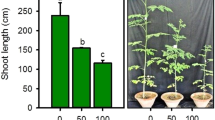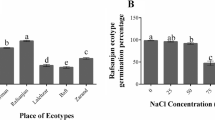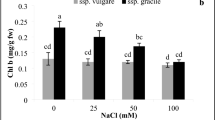Abstract
In this study, antioxidant processes were searched for in macrophyte duckweed to investigate tolerance mechanisms in this species against oxidative damage caused by salinity stress. Biochemical and histological analyses were performed on four Lemna aequinoctialis clones grown in Schenk-Hildebrandt medium, 0.5 × SH, supplemented with 1% sucrose liquid medium containing or not containing NaCl in different NaCl concentrations (0, 25 and 50 mM). For most clones, the salt stress effects caused growth inhibition and antioxidant responses at 50 mM NaCl. Also, starch and reducing sugar accumulations were increased with salt, whereas the photosynthetic pigment content was reduced in clone L. aequinoctialis 5569. The plant growth inhibition reflects the oxidative stress shown by the significant increase in malondialdehyde (MDA) and hydrogen peroxide (H2O2) content. In the L. aequinoctialis 5568 clone, with the highest MDA levels, no antioxidant enzymatic activity was observed. The L. aequinoctialis 5570 clone presented higher ascorbate peroxidase and catalase activities in parallel, indicating that the efficiency of the defence mechanism relies on synchrony between such enzyme activities toward successive elimination of reactive oxygen species and resulting in the assurance of some level of protection of the metabolism from oxidative damage. Considering the moderate salt stress (25 mM), the maintenance of MDA content and small growth inhibition associated with the high starch production suggested the acclimation efficiency of L. aequinoctialis 5570 and 5567 clones, indicating that they may be suitable for cultivation under moderate saline conditions, serving as biofuel feedstock. In addition, this study demonstrates great intraspecific phenotypic plasticity of duckweed, L. aequinoctialis, from closely related clones.








Similar content being viewed by others
References
Abraham G, Dhar DW (2010) Induction of salt tolerance in Azolla microphylla Kaulf through modulation of antioxidant enzymes and ion transport. Protoplasma 245:105–111. https://doi.org/10.1007/s00709-010-0147-3
Acosta-Motos JR, Ortuño M, Bernal-Vicente A et al (2017) Plant responses to salt stress: adaptive mechanisms. Agronomy. https://doi.org/10.3390/agronomy7010018
Adem GD, Roy SJ, Zhou M, Bowman JP, Shabala S (2014) Evaluating contribution of ionic, osmotic and oxidative stress components towards salinity tolerance in barley. BMC Plant Biol. https://doi.org/10.1186/1471-2229-14-113
Agarwal S, Pandey V (2004) Antioxidant enzyme responses to NaCl stress in Cassia angustifolia. Biol Plant 48:555–560
Alexieva V, Sergiev I, Mapelli S, Karanov E (2001) The effect of drought and ultraviolet radiation on growth and stress markers in pea and wheat. Environment 24:1337–1344. https://doi.org/10.1046/j.1365-3040.2001.00778.x
Almeida P, Katsching D, Boer AH (2013) HKT transporters—state of the art. Int J Mol Sci 14:20359–20385. https://doi.org/10.3390/ijms141020359
Anderson KE, Lowman Z, Stomp A-M, Chang J (2011) Duckweed as a feed ingredient in laying hen diets and its effect on egg production and composition. Int J Poult Sci 10:4–7. https://doi.org/10.3923/ijps.2011.4.7
Appenroth KJ, Krech K, Keresztes A et al (2010) Effects of nickel on the chloroplasts of the duckweeds Spirodela polyrhiza and Lemna minor and their possible use in biomonitoring and phytoremediation. Chemosphere 78:216–223
Appenroth KJ, Borisjuk N, Lam E (2013) Telling duckweed apart: genotyping technologies for Lemnaceae. Chin J Appl Environ Biol 19:1–10
Azevedo RA, Alas RM, Smith RJ, Lea PJ (1998) Response of antioxidant enzymes to transfer from elevated carbon dioxide to air and ozone fumigation, in the leaves and roots of wild-type and a catalase-deficient mutant of barley. Physiol Plant 104:280–292
Azevedo R, Carvalho RF, Cia MC, Gratão PL (2011) Sugarcane under pressure: an overview of biochemical and physiological studies of abiotic stress. Trop Plant Biol 4:42–51. https://doi.org/10.1007/s12042-011-9067-4
Azevedo Neto AD, Pereira PPA, Costa DP, Santos ACC (2011) Fluorescência da clorofila como uma ferramenta possível para seleção de tolerância à salinidade em girassol. Rev Cien Agron 42:893–897. https://doi.org/10.1590/S1806-66902011000400010
Balibrea ME, Dell’Amico J, Bolarín MC, Pérez-Alfocea F (2000) Carbon partitioning and sucrose metabolism in tomato plants growing under salinity. Physiol Plant 110:503–511
Berlyn GP, Miksche JP (1976) Botanical microtechnique and cytochemistry. The Iowa State University Press, Ames
Bezerra Neto E, Barreto LP (2011) Análises químicas e bioquímicas em plantas. Editora Universitária da UFRPE, Recife
Bonates LC de M (1993) Estudos ecofisiológicos de Orchidaceae da Amazônia II—Anatomia ecologia foliar de espécies com metabolismo CAM de uma campina da Amazônia Central. Acta Amaz 23:315–348
Borisjuk N, Chu P, Gutierrez R et al (2015) Assessment, validation and deployment strategy of a two-barcode protocol for facile genotyping of duckweed species. Plant Biol 17:42–49. https://doi.org/10.1111/plb.12229
Bradford MM (1976) A rapid and sensitive method for the quantitation of microgram quantities of protein utilizing the principle of protein-dye binding. Anal Biochem 72:248–254. https://doi.org/10.1016/0003-2697(76)90527-3
Bukatsch F (1972) Bemerkungen zur doppelfärbung astrablau-safranin. Mikrokosmos 8:255
Chang IH, Cheng KT, Huang PC et al (2012) Oxidative stress in greater duckweed (Spirodela polyrhiza) caused by long-term NaCl exposure. Acta Physiol Plant 34:1165–1176. https://doi.org/10.1007/s11738-011-0913-7
Chaves MM, Flexas J, Pinheiro C (2009) Photosynthesis under drought and salt stress: regulation mechanisms from whole plant to cell. Ann Bot 551–560. https://doi.org/10.1093/aob/mcn125
Cheng TS (2011) NaCI-induced responses in giant duckweed (Spirodela polyrhiza). J Aquat Plant Manage 49:62–71
Cheng JJ, Stomp AM (2009) Growing duckweed to recover nutrients from wastewaters and for production of fuel ethanol and animal feed. Clean Soil Air Water 37:17–26. https://doi.org/10.1002/clen.200800210
Cia MC, Guimarães a CR, Medici LO et al (2012) Antioxidant responses to water deficit by drought-tolerant and -sensitive sugarcane varieties. Ann Appl Biol 161:313–324. https://doi.org/10.1111/j.1744-7348.2012.00575.x
Cui W, Cheng JJ (2015) Growing duckweed for biofuel production: a review. Plant Biol 17:16–23. https://doi.org/10.1111/plb.12216
Cui W, Xu J, Cheng JJ, Stomp AM (2011) Starch accumulation in duckweed for bioethanol production. Biol Eng 3:187–197. https://doi.org/10.13031/2013.37123
Fahn A, Cutler DF (1992) Xerophytes. Gebruder Borntraeger, Berlin
Fodorpataki L, Bartha L (2008) Differential sensitivity of the photosynthetic apparatus of a freshwater green alga and of duckweed exposed to salinity and heavy metal stress. In: Allen JF, Gantt E, Golbeck J, Osmond B (eds) Photosynthesis. Energy from the sun: 14th international congress on photosynthesis. Springer, New York, pp 1451–1454
Franceschi VR, Nakata PA (2005) Calcium oxalate in plants: formation and function. Annu Rev Plant Biol 56:41–71. https://doi.org/10.1146/annurev.arplant.56.032604.144106
Franklin GL (1945) Preparation of thin sections of synthetic resins and wood-resin composites, and a new macerating method for wood. Nature 155:51–51. https://doi.org/10.1038/155051a0
Giannopolitis CN, Ries SK (1977) Superoxide dismutases: I. Occurrence in higher plants. Plant Physiol 59:309–314
Greenway H, Munns R (1980) Mechanisms of salt tolerance in nonhalophytes. Annu Rev Plant Physiol 31:149–190
Havir E, McHale N (1987) Biochemical and developmental characterization of multiple forms of catalase in tobacco leaves. Plant Physiol 84:450–455. https://doi.org/10.1104/pp.84.2.450
Heath RL, Packer L (1968) Photoperoxidation in isolated Chloroplasts. I. Kinetics and stoichiometry of fatty acid peroxidation. Arch Biochem Biophys 125:189–198
Hou W, Chen X, Song G et al (2007) Effects of copper and cadmium on heavy metal polluted waterbody restoration by duckweed (Lemna minor). Plant Physiol Biochem 45:62–69. https://doi.org/10.1016/j.plaphy.2006.12.005
Jensen WA (1962) Botamical histochemistry: principles and practice. W.H. Freeman and Company, San Francisco
Joseph EA, Radhakrishnan VV, Mohanan KV (2015) A study on the accumulation of proline—an osmoprotectant amino acid under salt stress in some native rice cultivars of North Kerala, India. Univ J Agric Res 3:15–22. https://doi.org/10.13189/ujar.2015.030104
Karuppanapandian T, Kim W (2013) Cobalt-induced oxidative stress causes growth inhibition associated with enhanced lipid peroxidation and activates antioxidant responses in Indian mustard (Brassica juncea L.) leaves. Acta Physiol Plant 35:2429–2443. https://doi.org/10.1007/s11738-013-1277-y
Koca H, Bor M, Ozdemir F (2007) The effect of salt stress on lipid peroxidation, antioxidative enzymes and proline content of sesame cultivars urkan. Environ Exp Bot 60:344–351. https://doi.org/10.1016/j.envexpbot.2006.12.005
Lam E, Appenroth KJ, Michael T et al (2014) Duckweed in bloom: the 2nd international conference on duckweed research and applications heralds the return of a plant model for plant biology. Plant Mol Biol 84:737–742. https://doi.org/10.1007/s11103-013-0162-9
Landolt E (1986) Biosystematic investigations in the family of duckweeds (Lemnaceae), vol 2. Veroff. Geobot. Inst., Rubel
Lemoine R, La Camera S, Atanassova R, Dédaldéchamp F et al (2013) Source to sink transport and regulation by environmental factors. Front Plant Sci 4:1–21. https://doi.org/10.3389/fpls.2013.00272
Lichtenthaler H, Wellburn A (1983) Determinations of total carotenoids and chlorophylls b of leaf extracts in different solvents. Biochem Soc Trans 11:591–592. https://doi.org/10.1042/bst0110591
Liu C, Dai Z, Sun H (2017) Potential of duckweed (Lemna minor) for removal of nitrogen and phosphorus from water under salt stress. J Environ Manage 187:497–503. https://doi.org/10.1016/j.jenvman.2016.11.006
Ma YB, Zhu M, Yu CJ et al (2018) Large-scale screening and characterisation of Lemna aequinoctialis and Spirodela polyrhiza strains for starch production. Plant Biol 20:357–364. https://doi.org/10.1111/plb.12679
Malavolta E, Vitti GC, Oliveira SA (1989) Avaliação do estado nutricional das plantas—princípios e aplicações. Associação Brasileira para a Pesquisa da Potassa e do Fosfato, Piracicaba
Miller GL (1959) Use of dinitrosalicylle acid for determination of reducing sugar. Anal Chem 11:426–428
Mittler R (2002) Oxidative stress, antioxidants and stress tolerance. Trends Plant Sci 7:405–410
Moller IM, Jensen PE, Hansson A (2007) Oxidative modifications to cellular components in plants. Annu Rev Plant Biol 58:459–481. https://doi.org/10.1146/annurev.arplant.58.032806.103946
Munns R, Tester M (2008) Mechanisms of salinity tolerance. Annu Rev Plant Biol. https://doi.org/10.1146/annurev.arplant.59.032607.092911
Nakano Y, Asada K (1981) Hydrogen-peroxide is scavenged by ascorbate-specific peroxidase in spinach-chloroplasts. Plant Cell Physiol 22:867–880
Oukarroum A, Bussotti F, Goltsev V, Kalaji HM (2015) Correlation between reactive oxygen species production and photochemistry of photosystems I and II in Lemna gibba L. plants under salt stress. Environ Exp Bot 109:80–88. https://doi.org/10.1016/j.envexpbot.2014.08.005
Panda SK, Upadhyay RK (2003) Salt stress injury induces oxidative alterations and antioxidative defence in the roots of Lemna minor. Biol Plant 48:249–253. https://doi.org/10.1023/B:BIOP.0000033452.11971.fc
Prasad M, Malec P, Waloszek A et al (2001) Physiological responses of Lemna trisulca L. (duckweed) to cadmium and copper bioaccumulation. Plant Sci 161:881–889
Prychid CJ, Rudall PJ (1999) Calcium oxalate crystals in monocotyledons: a review of their structure and systematics. Ann Bot 84:725–739. https://doi.org/10.1006/anbo.1999.0975
Reale L, Ferranti F, Mantilacci S et al (2016) Cyto-histological and morpho-physiological responses of common duckweed (Lemna minor L.) to chromium. Chemosphere 145:98–105. https://doi.org/10.1016/j.chemosphere.2015.11.047
Schenk RU, Hildebrandt AC (1972) Medium and techniques for induction and growth of monocotyledonous and dicotyledonous plant cell cultures. Can J Bot 50:199–204. https://doi.org/10.1139/b72-026
Shabala S, Munns R (2012) Salinity stress: physiological constraints and adaptive mechanisms. CABI, London. https://doi.org/10.1079/9781780647296.0024
Shepherd G, Urbanetz C (2010) FITOPAC 2.1
Sikorski Ł, Piotrowicz-Cieślak AI, Adomas B (2013) Phytotoxicity of sodium chloride towards common duckweed (Lemna Minor L.) and yellow lupin (Lupinus luteus L.). Arch Environ Prot 39:117–128. https://doi.org/10.2478/aep-2013-0018
Sree KS, Appenroth K (2014) Increase of starch accumulation in the duckweed Lemna minor under abiotic stress. Albanian J Agric Sci 11–14
Sree KS, Adelmann K, Garcia C et al (2015) Natural variance in salt tolerance and induction of starch accumulation in duckweeds. Planta 241:1395–1404. https://doi.org/10.1007/s00425-015-2264-x
Szabó-Nagy A, Galiba G, Erdei L (1992) Induction of soluble phosphatases under ionic and non-ionic osmotic stresses in wheat. J Plant Physiol 140:629–633
Tanou G, Molassiotis A, Diamantidis G (2009) Induction of reactive oxygen species and necrotic death-like destruction in strawberry leaves by salinity. Environ Exp Bot 65:270–281. https://doi.org/10.1016/j.envexpbot.2008.09.005
Tkalec M, Prebeg T, Roje V et al (2008) Cadmium-induced responses in duckweed Lemna minor L. Acta Physiol Plant 30:881–890. https://doi.org/10.1007/s11738-008-0194-y
Wang W, Vinocur B, Altman A (2003) Plant responses to drought, salinity and extreme temperatures: towards genetic engineering for stress tolerance. Planta 218:1–14. https://doi.org/10.1007/s00425-003-1105-5
Willadino L, Camara TR (2010) Tolerância das plantas à salinidade: aspectos fisiológicos e bioquímicos. Encicl Biosf 6:1–23
Witham FH, Blaydes DF, Devlin RM (1971) Experiments in plant physiology. D.V. Nostrand, New York
Xu J, Cui W, Cheng JJ, Stomp A-M (2011) Production of high-starch duckweed and its conversion to bioethanol. Biosyst Eng 110:67–72. https://doi.org/10.1016/j.biosystemseng.2011.06.007
Xue H, Xiao Y, Jin Y et al (2012) Genetic diversity and geographic differentiation analysis of duckweed using inter-simple sequence repeat markers. Mol Biol Rep 39:547–554. https://doi.org/10.1007/s11033-011-0769-3
Yazici I, Türkan I, Sekmen AH, Demiral T (2007) Salinity tolerance of purslane (Portulaca oleracea L.) is achieved by enhanced antioxidative system, lower level of lipid peroxidation and proline accumulation. Environ Exp Bot 61:49–57. https://doi.org/10.1016/j.envexpbot.2007.02.010
Zhao X, Moatesa GK, Wellnera N et al (2014) Chemical characterisation and analysis of the cell wall polysaccharides of duckweed (Lemna minor). Carbohydr Polym 111:410–418. https://doi.org/10.1016/j.carbpol.2014.04.079
Ziegler P, Adelmann K, Zimmer S et al (2015) Relative in vitro growth rates of duckweeds (Lemnaceae)—the most rapidly growing higher plants. Plant Biol 17:33–41. https://doi.org/10.1111/plb.12184
Acknowledgements
The authors gratefully acknowledge the Universidade Federal de Pernambuco for support and Coordenação de Aperfeiçoamento de Pessoal de Nível Superior (CAPES) for a scholarship granted to the first author.
Author information
Authors and Affiliations
Corresponding author
Ethics declarations
Conflict of interest
The authors declare no conflicts of interest.
Rights and permissions
About this article
Cite this article
de Morais, M.B., Barbosa-Neto, A.G., Willadino, L. et al. Salt Stress Induces Increase in Starch Accumulation in Duckweed (Lemna aequinoctialis, Lemnaceae): Biochemical and Physiological Aspects. J Plant Growth Regul 38, 683–700 (2019). https://doi.org/10.1007/s00344-018-9882-z
Received:
Accepted:
Published:
Issue Date:
DOI: https://doi.org/10.1007/s00344-018-9882-z




